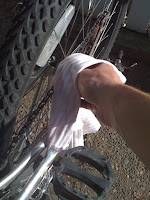“The world will little note, nor long remember what we say here, but it can never forget what our nation does or does not do at Copenhagen. It is for Barack Obama to undertake the unfinished work of climate change mitigation and nobly advance a treaty that will ensure the survival of all nations and peoples.”
On the last day of unproductive climate talks in Bonn, Germany, Abraham Lincoln came to the Hill with a message for President Obama: it’s time to rise to the challenge of the century and solve global warming.

Honest Abe was joined by a group of young climate activist from around the country in calling for President Obama to commit to attend the UN climate negotiations in Copenhagen this December. As Lincoln demonstrated remarkable leadership in the face of unprecedented challenges, so too must President Obama show bold global leadership in halting climate change. By publicly committing to go to Copenhagen, Obama will prove that stopping global warming is truly a priority of his administration.
In the halls of Congress (and outside the Capitol South metro station) Honest Abe delivered his “Copenhagen Address”—a riff off of Lincoln’s most renowned speech tailored to address the crippling lack of US leadership in halting climate change:
“It is often said that global recession precludes the possibility of strong climate mitigation. But, in a larger sense, we cannot back down from this challenge, lest it continues to grow until waters overwhelm out coastal cities, deserts encroach on our fertile plains, and the parched voice of a mother with no water for her child calls to her relative far away, only to find that she has been displaced by floods. In the face of such a future, we have no choice but to demand that our leader, Barack Obama, consecrates the negotiations at Copenhagen with his presence.”
Lincoln drew the attention of hundreds of commuters slowly winding their way out of the metro station, and caused quite a stir outside the Energy & Commerce subcommittee markup before he was asked to leave by the capitol police.
The Copenhagen Address was strategically delivered at a key point during the buildup to Copenhagen, on the last day of the UN climate talks in Bonn. The Bonn negotiations failed to spark the dramatic progress that is necessary to produce a strong international climate treaty in December, and time to make crucial international agreements is quickly running out. Industrialized countries refused to agree to the aggressive emissions reductions in the near-term, and the talks largely stalled as developed countries pushed for even weaker targets. Although Obama’s team has claimed to support a strong treaty, the US failed to take a leadership role at Bonn.
Our message as youth is simple: actions speak louder than words. To prove that the US will truly take the lead in solving climate change, Obama must utilize his global political capital to push all nations toward a scientifically sound, politically aggressive Copenhagen treaty. In openly committing to going to Copenhagen, Obama will draw much-needed attention to the negotiations, and send a clear message to other nations that the US will not obstruct climate negotiations this time around.
As President, Obama must also pressure policymakers at home to ensure that the US takes a leadership role by addressing global warming at home. Passing a vigorous domestic energy bill that provides for clean, sustainable energy infrastructure is a crucial part of this process. This bill in it’s current form, the American Clean Energy and Security Act (ACESA), provides for only a 3% reduction in CO2 emissions below 1990 levels by 2020. As such, ACESA will likely fail to cut US emissions enough to slow climate change, nor is it sufficient to convince other nations that the US is prepared to take global warming seriously on an international stage. With special interests continuing to poke holes in the bill, it is possible that ACESA will generate even poorer results.
The President’s appearance in Copenhagen, in conjunction with moving a strong climate bill through Congress, would provide a serious and committed stance on battling climate change. As young people, we will inherit the disastrous results of global warming: rising ocean levels, extreme storms, widespread drought and desertification, the spread of disease, the rapid loss of entire ecosystems—the list goes on and on. Because we are the ones who must live with the consequences of inaction, we have united around the globe to call for a strong climate treaty. Lincoln’s appearance at the Rayburn Building during the ACESA markups served as a reminder to Congress that domestic leadership is crucial to building an effective, equitable, and aggressive climate treaty in December.



















